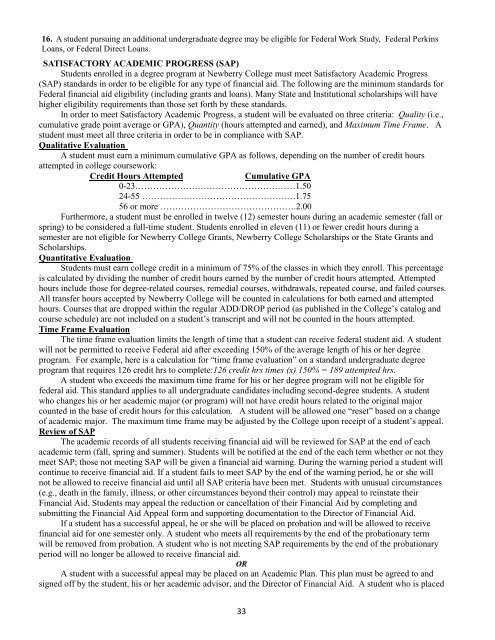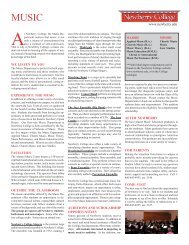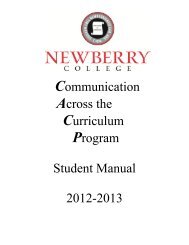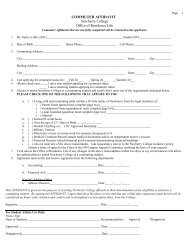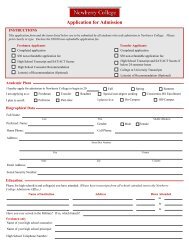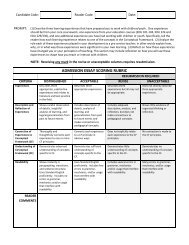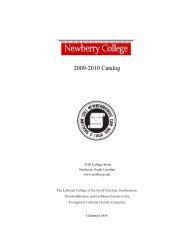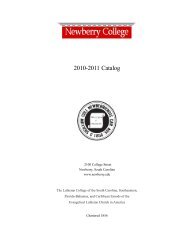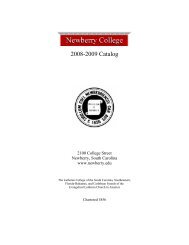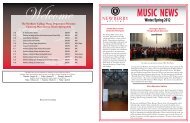2009-2010 Catalog II - Newberry College
2009-2010 Catalog II - Newberry College
2009-2010 Catalog II - Newberry College
Create successful ePaper yourself
Turn your PDF publications into a flip-book with our unique Google optimized e-Paper software.
16. A student pursuing an additional undergraduate degree may be eligible for Federal Work Study, Federal Perkins<br />
Loans, or Federal Direct Loans.<br />
SATISFACTORY ACADEMIC PROGRESS (SAP)<br />
Students enrolled in a degree program at <strong>Newberry</strong> <strong>College</strong> must meet Satisfactory Academic Progress<br />
(SAP) standards in order to be eligible for any type of financial aid. The following are the minimum standards for<br />
Federal financial aid eligibility (including grants and loans). Many State and Institutional scholarships will have<br />
higher eligibility requirements than those set forth by these standards.<br />
In order to meet Satisfactory Academic Progress, a student will be evaluated on three criteria: Quality (i.e.,<br />
cumulative grade point average or GPA), Quantity (hours attempted and earned), and Maximum Time Frame. A<br />
student must meet all three criteria in order to be in compliance with SAP.<br />
Qualitative Evaluation<br />
A student must earn a minimum cumulative GPA as follows, depending on the number of credit hours<br />
attempted in college coursework:<br />
Credit Hours Attempted Cumulative GPA<br />
0-23………………………………………………1.50<br />
24-55 …………………………………………….1.75<br />
56 or more ……………………………………….2.00<br />
Furthermore, a student must be enrolled in twelve (12) semester hours during an academic semester (fall or<br />
spring) to be considered a full-time student. Students enrolled in eleven (11) or fewer credit hours during a<br />
semester are not eligible for <strong>Newberry</strong> <strong>College</strong> Grants, <strong>Newberry</strong> <strong>College</strong> Scholarships or the State Grants and<br />
Scholarships.<br />
Quantitative Evaluation<br />
Students must earn college credit in a minimum of 75% of the classes in which they enroll. This percentage<br />
is calculated by dividing the number of credit hours earned by the number of credit hours attempted. Attempted<br />
hours include those for degree-related courses, remedial courses, withdrawals, repeated course, and failed courses.<br />
All transfer hours accepted by <strong>Newberry</strong> <strong>College</strong> will be counted in calculations for both earned and attempted<br />
hours. Courses that are dropped within the regular ADD/DROP period (as published in the <strong>College</strong>‘s catalog and<br />
course schedule) are not included on a student‘s transcript and will not be counted in the hours attempted.<br />
Time Frame Evaluation<br />
The time frame evaluation limits the length of time that a student can receive federal student aid. A student<br />
will not be permitted to receive Federal aid after exceeding 150% of the average length of his or her degree<br />
program. For example, here is a calculation for ―time frame evaluation‖ on a standard undergraduate degree<br />
program that requires 126 credit hrs to complete:126 credit hrs times (x) 150% = 189 attempted hrs.<br />
A student who exceeds the maximum time frame for his or her degree program will not be eligible for<br />
federal aid. This standard applies to all undergraduate candidates including second-degree students. A student<br />
who changes his or her academic major (or program) will not have credit hours related to the original major<br />
counted in the base of credit hours for this calculation. A student will be allowed one ―reset‖ based on a change<br />
of academic major. The maximum time frame may be adjusted by the <strong>College</strong> upon receipt of a student‘s appeal.<br />
Review of SAP<br />
The academic records of all students receiving financial aid will be reviewed for SAP at the end of each<br />
academic term (fall, spring and summer). Students will be notified at the end of the each term whether or not they<br />
meet SAP; those not meeting SAP will be given a financial aid warning. During the warning period a student will<br />
continue to receive financial aid. If a student fails to meet SAP by the end of the warning period, he or she will<br />
not be allowed to receive financial aid until all SAP criteria have been met. Students with unusual circumstances<br />
(e.g., death in the family, illness, or other circumstances beyond their control) may appeal to reinstate their<br />
Financial Aid. Students may appeal the reduction or cancellation of their Financial Aid by completing and<br />
submitting the Financial Aid Appeal form and supporting documentation to the Director of Financial Aid.<br />
If a student has a successful appeal, he or she will be placed on probation and will be allowed to receive<br />
financial aid for one semester only. A student who meets all requirements by the end of the probationary term<br />
will be removed from probation. A student who is not meeting SAP requirements by the end of the probationary<br />
period will no longer be allowed to receive financial aid.<br />
OR<br />
A student with a successful appeal may be placed on an Academic Plan. This plan must be agreed to and<br />
signed off by the student, his or her academic advisor, and the Director of Financial Aid. A student who is placed<br />
33


